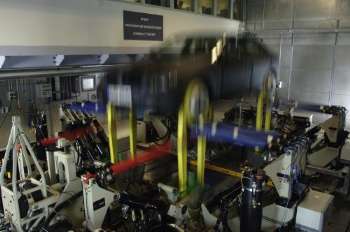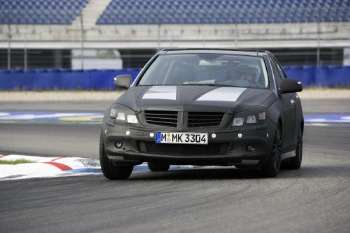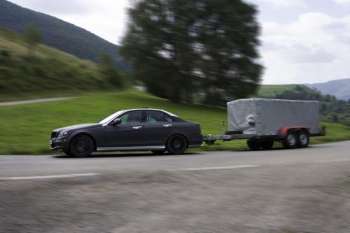|
| |||||
|
Testing the new Mercedes-Benz C-Class
17th January, 2007 | ||||
|
When the new Mercedes-Benz C-Class is launched in mid-2007 in Europe, later
in Australia, the Saloon will have completed the most comprehensive test
programme in the Stuttgart manufacturer's history. Over a period of three and a
half years, the prototypes and pre-production models have clocked up a total of
more than 24 million test kilometres all over the world. The tests performed on
the test rigs at the Mercedes-Benz Technology Centre in Sindelfingen were
equally extensive and intensive. Here the body and chassis were subjected to one
exceptionally tough test after another to simulate the loads and stresses of an
entire car lifetime within a matter of weeks. Each kilometre of these endurance
tests, which Mercedes-Benz also carries out on highly demanding test tracks, is
around 150 times tougher than everyday driving. These extreme tests form the
basis for the high long-term quality of the Mercedes passenger cars. Testing of the new C-Class began in (Northern) summer 2003. A
total of 280 prototypes completed systematic non-stop tests under various
climatic and topographic conditions. These included the "Heide" endurance test,
one of the world's toughest test programmes for newly developed cars. This
torture-track test, carried out over a period of four to six weeks, goes back
more than 50 years to a time when Mercedes performed much of its test driving on
Lüneburg Heath ("Heide" is the German word for "Heath”). It is equivalent to
300,000 kilometres of everyday driving by a Mercedes customer.
Mercedes-Benz replicated these pothole and cobblestone-covered routes at its
facilities in Stuttgart and Sindelfingen and now uses the data gathered during
these in-house tests to control test rigs. This means the highly sophisticated
rigs can relentlessly shake and bend car bodies around the clock to reproduce
the driving conditions experienced during the "Heide" torture-track endurance
test. The forces acting on the connecting points between the chassis and body
are immense – up to 20,000 Newtons – and they occur in quick succession. This is
equivalent to a weight of up to two tonnes. Durability testing: one of the world's toughest test programmes The computer data compiled during the "Heide"
torture-track endurance test are also used for chassis durability testing.
Complete front and rear axles go through this unique series of tests around the
clock on six servo-hydraulic test rigs. Mercedes engineers use four further
installations to test the wheels, wheel bearings and wheel hubs for 60 hours
non-stop on a simulated Hockenheimring Grand Prix circuit, during which time the
chassis components are subjected to colossal lateral forces that stretch them to
breaking point.
Similarly, the axle joints and bearings have to withstand extreme loads
before they get the go-ahead for series production and installation in the new
C-Class or other Mercedes models. In addition to permanent pressure and movement
tests with forces of up to 35,000 Newtons, axle components must also resist
extremely high temperatures of 90 degrees Celsius – verified in axle-joint field
tests in city traffic in Tokyo. Mercedes passenger cars also have to endure other simulated everyday
conditions during testing, such as a high-pressure water jet (80 bar) and the
systematic spraying of the joints with ice-cold dirty water and fine, hot sand
dust over a period of three weeks. The most extensive test cycle in this
environmental simulation lasts three weeks and includes over one million
axle-joint load cycles – far more than any Mercedes-Benz usually experiences
during its long lifetime. The Mercedes-Benz Technology Centre has a total of around 160 innovative test
rigs for chassis component durability testing alone. "World Test" on three continents Following a series of systematic long-distance tests
in everyday traffic and at proving grounds, during which the cars were subjected
to such high loads and stresses that they aged at a vastly accelerated rate, the
18-week "World Test" was one of the highlights of the systematic test marathon
for the new C-Class. Four fully equipped pre-production vehicles successfully
came through the tests in Germany, Finland, Dubai and Namibia. Here, under
widely fluctuating climatic and topographic conditions, all of the vehicle
components and systems – from the diesel particulate filter to the seats, from
the door hinges to the shock absorbers – were tested once again.
Furthermore, 15 new C-Class pre-production models took part in a stiff final
examination before production launch, involving tests in six countries within a
period of seven months. Never before has a newly developed Mercedes model
undergone such an extensive additional test programme – and passed with such
flying colours. For the final field test before production launch, Mercedes-Benz will be
sending out around 450 new, factory-produced C-Class Saloons for "near-launch
road trials" in which DaimlerChrysler employees will test the new model in
normal everyday situations, covering a total of around 16 million kilometres in
the process. This exhaustive series of tests is designed to ensure top quality
right from the start. | |||||
ABN 47106248033 |
 |
All rights reserved. |



